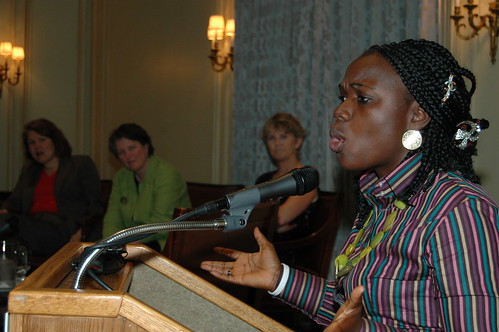By Deputy Secretary Kathleen Merrigan
On Friday afternoon, I had the opportunity to meet with some inspiring African businesswomen who are visiting the United States for the African Women’s Entrepreneurship Program and the African Growth and Opportunity Act (AGOA) Forum. This unique group of 36 successful women is here to participate in a two week fellowship training program that will introduce them to American trading partners and investors, expose them to American advocacy, and business models and will offer extended support to them when they return to their countries.
We were joined by two USDA employees who manage programs which involve and benefit women throughout the world and right here in the United States- Ann Tutwiler who coordinates the global food security initiative, "Feed the Future," and Judith Canales, USDA business administrator.
Our group discussed local and regional food systems, a subject very dear to my heart. Last year, I initiated the Know your Farmer, Know your Food program to encourage eating locally; American farmers feed our nation and the world, but they are all local to somewhere. Choosing regional produce encourages healthy eating with fresh food, vibrant communities, a strong connection between cities and the countryside, and support for this and the next generation of farmers and ranchers. This initiative will lead farmers to retain more of their food dollar while helping the public to understand agriculture and where their food comes from.
These benefits aren’t specific to America- I expressed to the African women, many of whom manage their own farm businesses, that this kind of promotion and mentality can be just as beneficial to them as it has been to our producers. Women in both America and African countries are slowly ascending into higher ranks, and it would be mutually beneficial to continue engaging with each other to overcome struggles through working groups as well as government collaboration.
I’d like to share with you the story of Oluyemisi Yetunde Iranloye, chief operating officer of Ekha Agro Farms Limited in Nigeria, which employs 200 people and supplies a quarter of the country’s demand for a glucose syrup used in pharmaceuticals, food, and brewing. Ms. Iranloye explained that her factory operates under capacity because local farmers cannot produce enough to meet her factory’s needs. She took matters into her own hands, and with the help of USAID, she helped organize female cassava farmers into co-operatives. They began to acquire tools and micro-finances needed to meet production needs.
In our meeting, it was apparent that despite cultural or language differences, women throughout the world have similar ideas and aspirations and work tirelessly to achieve their goals. I look forward to seeing these women at the African Growth and Opportunity Act Forum this week and I wish them the best of luck as they seek to expand their own businesses and create a stronger business climate back home.


